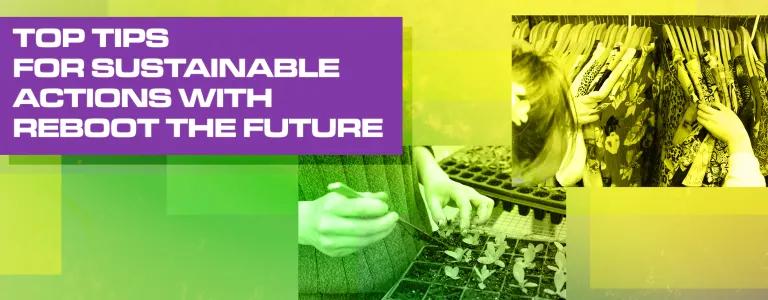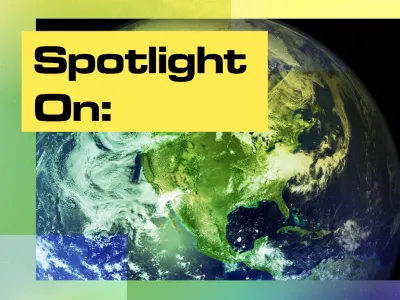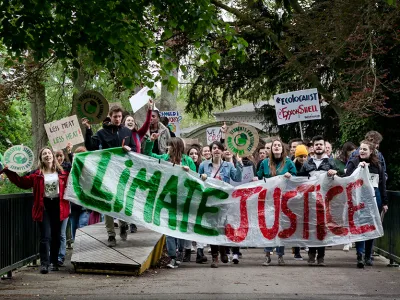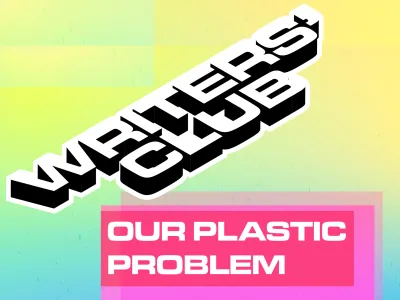
Top Tips For Sustainable Actions With Reboot The Future
Include this article in your Skills Builder Journal. It could help you develop... 
Reboot The Future is a small foundation with a big ambition. They want a more compassionate and sustainable world and are helping to build a generation of people who refuse to believe that the future is foreclosed. They believe that as well as making the technical, legislative and policy changes we so desperately need, we also need to significantly shift how we think and feel about our relationships to one another and the world. And talking about climate change is one aspect of that. But how do you start having these conversations with people around you? Well, here’s what they have to say...
The UK is currently hosting COP26 - the 26th United Nations “Conference of the Parties”, where leaders from governments, businesses and industries all around the world come together to discuss climate change and what actions they are taking to combat it.
COPs take place almost every year, and every COP comes with the tag of being “the most important COP ever”. COP26 might just actually be it. The combination of climate and COVID-19 crises has now created a ‘perfect storm’ for change.

Whilst the summit has the potential to shape world leaders’ responses to the climate crisis for many years to come, it can also feel disconnected from our day-to-day lives and the positive changes we aspire to.
Recent research shows that the environment tops the concerns that families have about the future – with over six out of ten saying they are worried about how environmental damage will affect future generations.
That’s why Reboot the Future have teamed up with Marks & Spencer to launch Reboot the Conversation, a new online hub to help you kickstart climate conversations with your family and friends.
Starting your climate conversations
Most people want to do their bit to slow down climate change and live a more “sustainable” lifestyle, but don’t always know where to start.
Put simply, living ‘sustainably’ means living in a way that can continue beyond our lifetime. A lot of the behaviour that has contributed to climate change – such as burning fossil fuels and cutting down trees – is unsustainable. It’s happened because we’ve only been thinking about the needs of our own generation, instead of thinking about the long-term future and the people who will live on the planet after us.
That’s why our first top tip for sustainable action is to start talking about climate change with the people you care about. Conversations are often the first step towards making a difference, because they make us more aware of our behaviours and beliefs, and help us to think about what we can change.
At Reboot the Conversation, you can find bite-size discussion videos, facts and prompts to help you kick start conversations with your families and friends. You can also watch videos of real young climate campaigners and their family members talking about their efforts to live more sustainably.

More top tips for taking positive action
There are probably ways you are already taking positive steps to help the climate but may not realise it, for example, eating vegetarian food rather than meat, buying second hand clothes, or walking and cycling.
When taking action on the climate, it is always best to start with an area you feel interested in, and to then build on it. Change won’t happen overnight, but it does happen, and all the small steps add up.
Here are some of our top tips for living more sustainably that you can find out more about at Reboot the Conversation:
Taking action through nature
GET PLANTING - Plants absorb and store CO2 – they’re nature’s air filters. Planting flowers, shrubs or trees (inside or outdoors) will provide food and homes for wildlife while also cleansing the air. Start small in your own home, garden or balcony, or start a community group to create green zones in your local area.
GO ON A DATE WITH NATURE - As well as being good for our mental and physical health, building a relationship with the natural world makes us more likely to want to protect it. Spend time outdoors every week or bring nature inside by growing and caring for a plant.
WALK OR CYCLE TO SCHOOL OR WORK - Choosing to walk or cycle instead of using the car reduces CO2 emissions from petrol or diesel. It’s also good for your overall health and wellbeing.
Taking action through food
FREEZE BEFORE IT GOES OUT OF DATE - There are lots of foods that can be frozen (including milk, bread, meat and many vegetables), which means you can store them past their ‘use-by’ date instead of throwing them away. This simple step can reduce the amount of food going to landfill and, in turn, reduce methane levels.
EAT MORE PLANT-BASED MEALS - Halving your meat consumption could cut your personal carbon emissions by as much as 20-30%. There are now more delicious plant-based alternatives on offer than ever before.
MAKE MEALS FROM YOUR LEFTOVERS - One way of preventing food ending up in landfill is getting creative with leftovers, instead of throwing them away. It’s better for the planet because it stops food waste from generating methane, plus it’s a fun challenge!

Taking action through fashion
PARTICIPATE IN THE 30 WEAR CHALLENGE - Good quality clothing with plenty of life left in it still ends up in landfill. By buying clothes that we know we’ll wear at least 30 times, we become less likely to make impulse purchases that end up going to waste.
RECYCLE, SHWOP OR PASS ON YOUR UNWANTED CLOTHING - By recycling or passing clothes on – through schemes such as shwopping at M&S, donating to charity shops or using second-hand-clothing apps – you can keep them out of landfill for longer. This also decreases the demand for new clothes, helping save resources and energy that would be used to create them.
WASH YOUR CLOTHES LESS FREQUENTLY AND AT 30 DEGREES - By only washing our clothes when they’re dirty, and waiting until you have a full load, you’ll save large amounts of water and energy. Plus, you’ll be reducing the amount of microplastics that end up in our waterways – washing clothes can release man-made fibres into the water.
We hope you feel inspired to visit Reboot the Conversation and to start your own climate conversations with your family and friends - let us know how you get by tagging us @futurereboot and using the hashtag #reboottheconversation on Instagram, Facebook or Twitter.
For further information about the campaign, please feel free to email rebecca@rebootthefuture.org




